Like Cervantes and Goethe, Dante (1265-1321) was a ‘man of his time’, so much so that he was prior of Florence, i.e. one of its senators. So to understand the poet we must contextualise him in the Middle Ages.
In the century in which Dante was born, another Italian who would greatly influence Western civilisation, St Francis, whom my father taught me to admire in my adolescence, had founded an order of mendicant friars. On one occasion, speaking of the saint of Assisi, my father mentioned that in one town he had cast out demons. There are still people who believe that. My mother told an anecdote about some nuns in Coyoacán who said to her that the devil made noises in the convent, but that they laughed because they knew he wasn’t going to tempt them. My mother said this not as the nuns’ hallucination: she accepted their demonological interpretation of the noises.
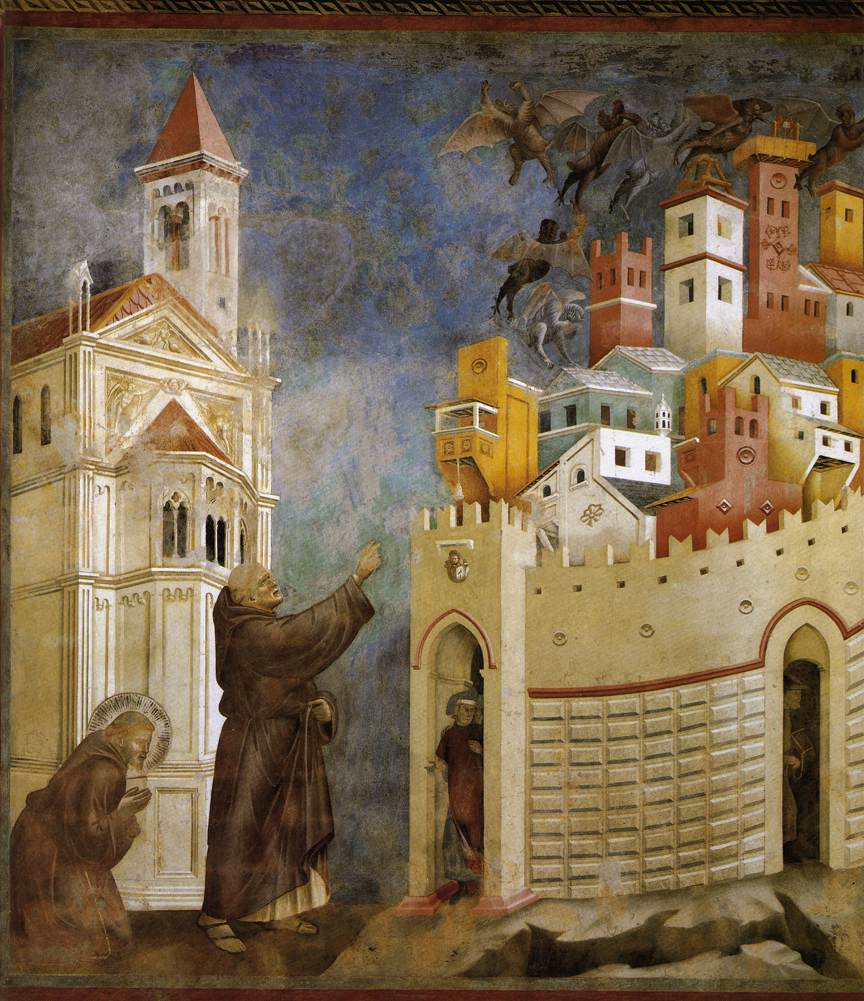
Francis exorcises the demons at Arezzo, fresco by Giotto.
When Francis died, Thomas Aquinas was born, the Italian who fixed the doctrine of the Catholic Church to the extent that one pope called his theological legacy aeternis patris. We can already imagine Voltaire’s mockery of Aquinas in his Philosophical Dictionary. But from the point of view of the priest of the sacred words—a fancy way of referring to a contemporary National Socialist—Voltairean sarcasm is of little use if the Enlightenment bequeathed us the universal declaration of human rights: neochristianity. But let’s take it one step at a time.
In my article on Cervantes, I asked what was the point of the Golden Age of Castilian letters if the Church didn’t allow them to write freely. In Dante’s time there was already the University of Bologna, but what happened when someone wanted to philosophise free of the theological yoke? When Francis was alive, in Paris in 1210, several readers of Aristotle had concluded that there was no life after death. We can imagine how such ‘heresy’ would affect the control of the European population through the spiritual terror—fear of damnation—with which the Church controlled them. The reaction of the bishop of the city was not long in coming. Ten of the freethinkers were burned at the stake: a ‘hard totalitarianism’ compared to the ‘soft totalitarianism’ of today. (Nowadays they no longer burn the heretic, they only imprison him. Recall that two men who have commented on this site, Tyrone Joseph Walsh and Christopher Gibbons, are serving years in the UK for thoughtcrimes).
By Dante’s time, however, banking and the power of emperors were beginning to emerge, acting as counterweights to the once all-powerful Church, although Pope Boniface VIII tried to bring down that counterweight in Italy. Florence in particular felt the renaissance of the age: its arts were revived in that city with its characteristic tower houses, such as the one in the illustration above (even the tourist of our century can still appreciate something of the medieval air in some Florentine quarters).
Let us recall, in our abridgement of Karlheinz Deschner’s book, how the Church acted as the lobotomist of the Greco-Roman man since Constantine. Here we will only focus on one more example. Due to the translations of Aristotle and Galen, ancient medicine was already becoming accessible. But when, at the end of Dante’s life, a certain Mondino de Liuzzi began to dissect corpses, he came up against ecclesiastical authority. Pietro d’Abano, an illustrious physician, was even persecuted by the Inquisition and, after his death, his body was burned at the stake.
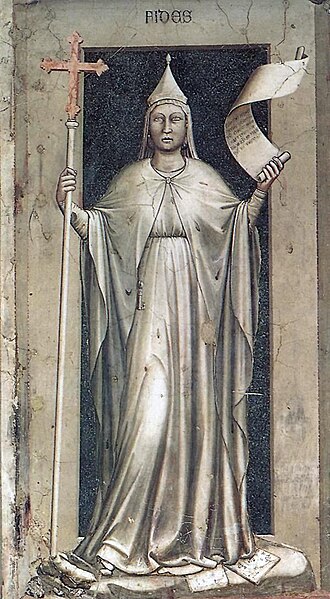
Fides (Faith) by Giotto. In the Middle Ages, Faith had the Aryan mind chained.
And the ‘men against their time’? In a world of hard totalitarianism they simply couldn’t flourish, although we must mention the English Franciscan Roger Bacon (1214-1292), who despite being persecuted attributed a new meaning to natural science and mathematics, which in centuries to come would become the foundation of experimental research. Nor should we fail to mention the Scotsman Duns Scotus (1263-1308), the only intellectual to question the doctrine of eternal damnation in a thousand years of Christendom! But this was the same century in which the Dominican order was founded: an order of learned theologians who were trained to fight the doctrines that the Newspeak of the time called ‘heretical’ (the term for social ostracism which in medieval times was equivalent to the ‘racist’ of our days). From this order came some of the greatest exponents of medieval thought, such as Aquinas.
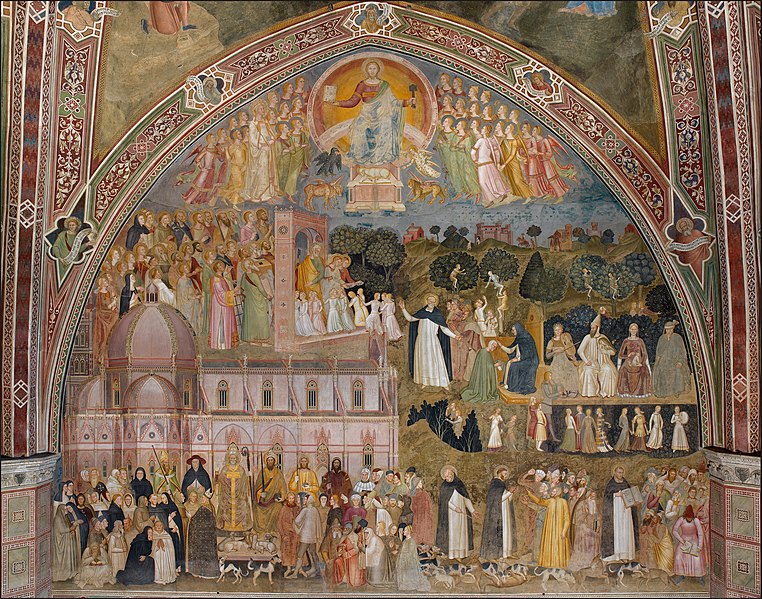
The Militant Church and the Triumph of the Dominicans, fresco by Andrea Bonaiuti in Florence.
Parallel to this orthodoxy that forced an iron faith on the white man, a ‘little renaissance’ emerged at the time when Dante flourished. The liberal arts such as grammar and rhetoric, or geometry, music and astronomy (or rather astrology) were following their course. Secular music in particular, including troubadour music, moved away from Gregorian chant while retaining a liturgical stamp. Frederick II of Swabia encouraged intense cultural activity.
Compared to our ‘Empire of the yin’ in the 21st century West, the Aryan psyche, specifically the Italian one, was extremely quarrelsome. In paintings we can see crenellated city walls with men at arms. The clashing of swords was an almost daily occurrence in the tumultuous life of the communes. This balance between Yang and yin, militia and arts, also existed in Hitler’s Germany but unlike medieval society was on the verge of breaking with the Christian Era (and would have broken with it for the good had it not been for Anglo-American intervention).
Beatrice
Con Beatrice m’era m’suso in cielo
(With Beatrice I was enclosed in heaven).
Dante first met Beatrice in 1274, but it was not until 1283 that he received his first greeting from the lady, who died in 1290, the year Giotto painted the Cross of Santa Maria Novella. A quarter of a century after the death of his platonic love he began the Inferno, although he wrote the Divine Comedy in many different places during his troubled life. At the age of fifty-six, Dante died poor in Ravenna, but his poem was a spectacular success after his death. Only Renaissance ideals and the new tastes they brought would cause Dante’s fame to eclipse. The 19th century, despite its infatuation with the Middle Ages, was heir to this contempt for scholasticism and its theology.
The Comedy transports us, first, to an underground journey, then to the ascent of the mountain where sins are being purged, and finally to an interplanetary flight. Many years ago a friend I knew in a chess park gave me, in three volumes, the best translation of the Comedy into our native language. I lent the first volume, the one on hell, to a girlfriend of my brother’s who was studying Italian but she never returned it to me. I have only a few scraps left of the book of the Purgatorio and only the one on Paradiso I keep in its entirety.
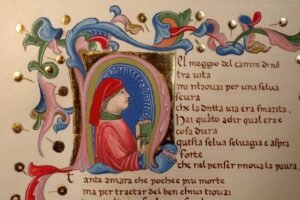 The opening lines of the first song, which can be seen in this codex, are still the most famous: ‘Midway upon the journey of our life / I found myself within a forest dark / For the straightforward pathway had been lost’. In my books I have used them to describe how I was for decades after the tragedy of my adolescence which left me without a career, without a job and—for reasons confessed in those books—without a partner. Being lost in a dark forest is a splendid metaphor for how I was before a Beatrice rescued me: the books of Alice Miller on parental abuse, with whom I got to correspond before she died.
The opening lines of the first song, which can be seen in this codex, are still the most famous: ‘Midway upon the journey of our life / I found myself within a forest dark / For the straightforward pathway had been lost’. In my books I have used them to describe how I was for decades after the tragedy of my adolescence which left me without a career, without a job and—for reasons confessed in those books—without a partner. Being lost in a dark forest is a splendid metaphor for how I was before a Beatrice rescued me: the books of Alice Miller on parental abuse, with whom I got to correspond before she died.
Before a Beatrice appeared in my life, at least on an intellectual level, I had tried to get out of the forest through neochristianity, specifically, a religious movement (‘Eschatology’) that emerged in the previous century, inspired by the New Testament: a movement I have already discussed on pages 11-26 of Daybreak. The medieval universe in which my father lived is evident in an anecdote from the early 1980s.
We were having a Sunday lunch at home with Uncle Beto when, for some reason, Eschatology came into the conversation. To scold me publicly my father, a traditional Catholic, alluded to a passage in the Inferno in which Dante had put heretics (Eschatology was schismatic, outside the Catholic Church) in a place where they were quartered. My father imitated with his hands a sort of scythe wielded by a devil to dismember them, in the belief that these heretics had ‘dismembered the Church’. There are many other symbolic passages in the Inferno, such as the twisted landscape and the twisted bodies in the jungle of the suicides (admirably recreated by Doré centuries later).
With apologies to the vox populi, it is a mistake to read the Inferno and stop there. For Salvatore Battaglia, ‘among the three cantigas of the Poem, this one of Purgatorio represents the most truthful presentation of the human condition’. The middle book is flanked by the books of the damned and the blessed. Purgatorio is the realm of poetry, and in my opinion, given that publishing a book in the vernacular language questioning the existence of hell was impossible in the Middle Ages, beauty was the most direct form of therapy against the fear of damnation, while the poet sublimates it in art and the dogma is no longer felt as it was before: it is ‘weathered’ with sublime lyricism (for example, each of the three books ends with the word stelle, stars). As a counterpoint, on 30 December 1995 I made a note in my copy:
I have barely read the summary and I think that the whole Dantean Comedy is bullshit. Why on earth build a beautiful cathedral on false principles? In other words, even supposing it is true what Octavio Paz says, that Dante is the poet of our Age, that is beside the point: what pisses me off is that the poet believed the Christian worldview. A contemporary of his, Duns Scotus, questioned the most psychotic doctrine of the universe; so there is no excuse ‘that at that time it couldn´t be broken’.
The Comedy is a triptych. In the final book, with Beatrice and Dante flying from planet to planet, the traveller enters from heaven to heaven, passing through the sky of Mars and then Saturn. There are very old paintings reflecting these Dantean passages. At the end he arrives at the empyrean, in the centre of which the poet looks face to face with the greatest of mysteries. In reality, this deity is ultimately the god of the Jews and what I wrote thirty years ago still holds: the freethinker cannot bear to be enraptured by the worldview of the Dark Ages.
Avete il Novo e ‘l Vecchio Testamento
e ‘l pastor della Chiesa che vi guida:
questo vi basti a vostro salvamento.
You have the New, the Old Testament
And the pastor of the Church is your guide:
This is enough to your salvation.
And even worse:
ond’ei credette in quella, e non sofferse
da indi il puzzo più del paganesmo;
e riprendíene le genti perverse.
that’s why he believed in her, and didn’t suffer from
the pestilence of paganism,
and reproved the wicked people.
This last passage appears in the song to the Heaven VI, where Dante speaks to those he considers to be righteous spirits. Obviously, the apologists of Christian doctrine had to reside in Dantean heaven.
Sometimes coffee conversations with friends are more profound than the musings of scholars. Many years ago the poet Carlos Mongar remarked to me that, much better than having written the Comedy, Dante would have had Beatrice in his arms and, in sexual intercourse, subject her ‘to the ultimate desecration’ implying that the lady would have been delighted to be possessed / desecrated by a Dante who would never have felt the need to become a poet.
Let us remember what happened to so many Werthers in real life. How many Christian prose and poetry would the white man have been spared if so many young men hadn’t been prevented by circumstances from marrying and procreating as the Gods command?
In the article on Goethe I also quoted an Austrian biographer who said that the most profound level of literary art is autobiography in which the artist betrays himself by daring to confess the truth about his life. Let us betray ourselves a little and confess that, precisely because the tragedy of my adolescence affected me to the extent that I was never able to hold a real Beatrice in my arms, I idealised the eternal feminine and that is what moves me to write.
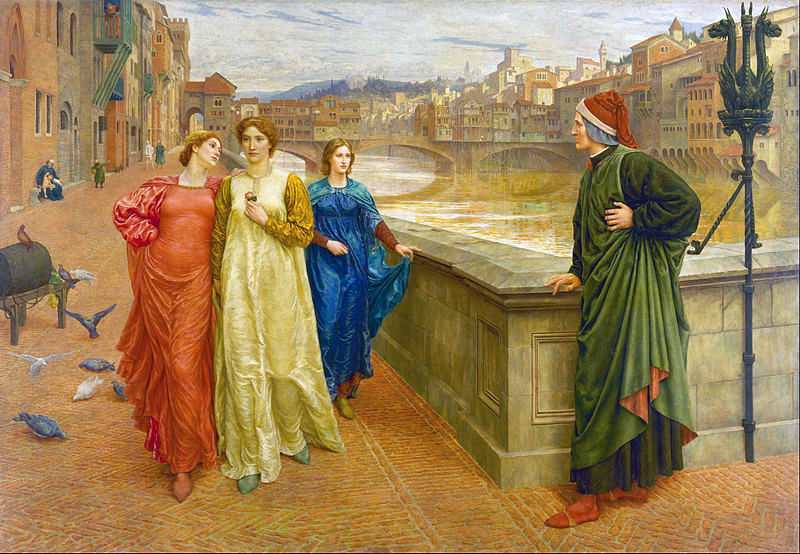
2 replies on “Dante”
Finally, as an entertaining introduction to medieval thought and worldview, I do not recommend the dry texts of historians, but The Name of the Rose by Umberto Eco.
Although, Duns Scotus was really Irish and was commemorated on the Irish five pound note:
LINK
One of his legacies to the English language is the word “dunce”.